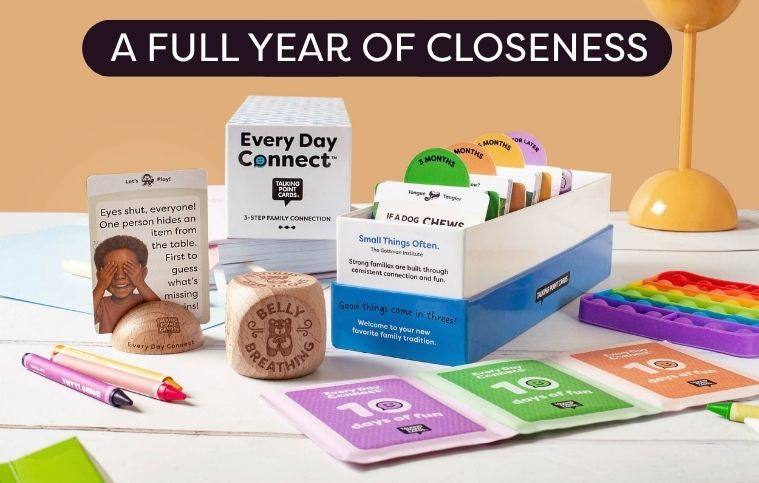SHOP
About
When Faith Gets Stuck In Sunday Mode
The Question That Changes Everything
Why We Avoid The Deep Stuff
The Magic Of The Right Question
What Happened Next
The Question Behind The Question
Starting Your Own Deep Conversations
Beyond Sunday Mornings
The Invitation
Shop
Sarah stared at the card in her hand, reading it for the third time. Her family sat around the dinner table, the usual post-meal chatter dying down as everyone noticed her hesitation.
What three questions would you most like to ask God?
"This one feels... big," she said, glancing up at her husband Mark and their two teenagers. They'd been using conversation cards for family time lately, but this question hit different. It wasn't about favorite movies or childhood memories. This was about faith, doubt, wonder – the stuff they talked about at church but somehow never really discussed at home.
"Too big?" Mark asked, already reaching for another card from the deck.
"No," Sarah said, surprising herself. "Let's do it."
What happened next changed everything about how their family talked about faith.
When Faith Gets Stuck in Sunday Mode
Here's what nobody tells you about raising kids in a Christian home: talking about faith can feel harder than it should.
You'd think it would be natural, right? You pray before meals, attend church regularly, read Bible stories. But when it comes to the real, messy, wonder-filled questions about God and life and what it all means – those conversations feel way more complicated.
Even families who grew up Christian often find faith conversations "a little uncomfortable" because we're afraid of saying the wrong thing, of not having all the answers, or of our kids thinking we're being "preachy."
So we stick to the safe stuff. How was school? What's for dinner? Did you finish your homework?
Meanwhile, our teenagers are wrestling with questions about purpose and meaning. Our spouses are navigating seasons of doubt or spiritual growth. And we're all kind of dancing around the very thing that's supposed to be the foundation of our family life.
The Question That Changes Everything
Back to Sarah's dinner table. When she read that question out loud – What three questions would you most like to ask God? – something shifted.
Her 16-year-old daughter Emma, who usually gave one-word answers to anything deeper than "pass the salt," actually looked up from her phone.
"Can I go first?" Emma asked.
And then she said something that made Sarah's heart skip: "I'd ask God why He lets bad things happen to good people. Like, I know all the Sunday school answers, but I really want to understand."
Mark set down his coffee mug. Their 14-year-old son Jake stopped fidgeting with his napkin. Even Sarah felt her shoulders relax – not because the question was easy, but because it was finally out there. The thing Emma had probably been thinking about for months, maybe years.
"That's such a good question, Em," Sarah said. "I think I'd ask that too."
And just like that, they were having the conversation they'd all been avoiding. Not because it was forced or scheduled, but because one simple question created space for it.
Why We Avoid the Deep Stuff
Here's the thing about faith conversations in families: we avoid them for really understandable reasons.
We're scared we don't know enough. What if our teenager asks about evolution and Genesis? What if our spouse brings up something they heard on a podcast that challenges what we believe? What if we say something that sounds cliche or damages their faith somehow?
We assume it'll be awkward. Many Christian families experience "awkward silence" when trying to discuss faith, so we stick to safer topics. But awkward isn't always bad – sometimes it just means we're touching on something that matters.
We think it has to be formal. Like we need to schedule "family devotions" with workbooks and prayer lists. But the most meaningful conversations usually happen when you're just... talking. Really talking.
We're worried about judgment. What if I admit I sometimes doubt? What if my question sounds stupid? What if my faith isn't as strong as everyone thinks it should be?
But here's what Sarah discovered that night: those fears dissolve pretty quickly when someone creates a safe space to be honest.
The Magic of the Right Question
After Emma shared her question about suffering, the floodgates opened.
Jake said he'd ask God what heaven is actually like, because all the descriptions he'd heard sounded "kind of boring, to be honest."
Mark admitted he'd want to know if he was doing enough to help people in need, or if he was just living comfortably while others suffered.
Sarah realized she'd ask God about timing – why some prayers seem to get answered quickly while others take years, or never seem to get answered at all.
For the next hour, they talked about doubt and wonder, about prayers that felt unanswered and moments when God felt really close. They shared stories Sarah had never heard before, fears she didn't know her kids were carrying, hopes she didn't know her husband was nurturing.
When families open conversations about faith and decision-making, it helps younger family members understand how Christian values can guide daily choices – but it also helps parents understand what their kids are really thinking about.

Rated #1 Christian Product
Deepen faith, strengthen fellowship, and spark meaningful conversations in families, small groups, and beyond.

What Happened Next (And Why It Matters)
That conversation didn't solve everything. Emma still has questions about suffering. Jake still wonders about heaven. Mark still wrestles with social justice. Sarah still gets frustrated with God's timing.
But something fundamental shifted in their family dynamic.
They started having these conversations more often. Not scheduled, not formal, just... natural. Emma brought up something from youth group. Jake asked about a Bible verse that confused him. Mark shared something he was learning in men's group.
The scary topics became normal topics. The deep questions became family questions.
And here's the beautiful part: their faith didn't get weaker from all the questioning and wondering. It got stronger. More real. More theirs.
The Question Behind the Question
What three questions would you most like to ask God?
On the surface, it's about curiosity and wonder. But underneath, it's really asking: What are you genuinely wrestling with? What keeps you up at night? Where do you need clarity, peace, or understanding?
It's permission to be human in your faith. To admit you don't have it all figured out. To wonder and wrestle and question – not as a sign of weak faith, but as evidence of living faith.
Christian conversation starters often pose questions that encourage individuals to reflect on their spiritual journey, personal beliefs, and experiences with faith – and that reflection is where real growth happens.
Starting Your Own Deep Conversations
You don't need a perfect setup or a theology degree to have meaningful faith conversations with your family.
You just need the right question at the right moment.
Maybe it's over dinner, like Sarah's family. Maybe it's during a car ride, or while you're doing dishes together, or during those few minutes before bedtime when kids are most talkative.
The key is creating space for honesty without judgment. When someone shares a doubt, don't rush to fix it. When someone asks a hard question, don't panic if you don't have a ready answer. When someone wonders about something that challenges your own beliefs, don't shut it down.
Listen first. Really listen. Not to craft your response, but to understand what's behind the question.
Share your own struggles. Your kids and spouse don't need you to have perfect faith. They need you to have real faith. The kind that includes questions and doubts and wrestling.
Make it normal. The more you talk about faith as part of regular life, the less scary and formal it becomes.
Be patient with silence. Sometimes the most meaningful conversations include long pauses while people think. That's not awkward – that's processing.
Beyond Sunday Mornings
The most beautiful thing about Sarah's family discovery is that faith became something they talked about on Tuesday afternoons and Thursday car rides, not just Sunday mornings.
Their kitchen table became a place where doubt and wonder were welcome. Where questions didn't need perfect answers. Where faith was something they explored together rather than something they performed alone.
And isn't that what we really want? Not families who can recite all the right answers, but families who feel safe asking the real questions. Who support each other through seasons of doubt and discovery. Who grow in faith together, messily and beautifully and honestly.
The Invitation
Maybe you're reading this and thinking about your own family, your own conversations, your own questions that feel too big or too scary to voice out loud.
What if they're not too big? What if they're exactly the right size for bringing you closer together, closer to truth, closer to God?
What if the question that feels too hard to ask is actually the question that opens up everything you've been hoping for?
What three questions would you most like to ask God?
Maybe it's time to find out what happens when you ask it.
Because the deepest conversations – the ones that change everything – they don't usually start with perfect words or perfect timing. They start with one person being brave enough to ask the question that everyone's been thinking about but nobody's been brave enough to voice.
They start with someone saying, "This feels big. Let's do it anyway."
Your kitchen table is waiting. Your family is waiting. The conversation you've been longing for – it's just one question away.
At Talking Point Cards, we believe that faith and fellowship grow deeper through open, honest conversations. Our carefully designed prompts help individuals, families, and groups explore life, purpose, and belief together - creating space for reflection, connection, and shared understanding. Because the most meaningful spiritual journeys are walked side by side, one conversation at a time.
Let's Stay Connected
Love what you’re reading? There’s more where that came from. Get fresh ideas, inspiring tips, and simple ways to spark deeper conversations - delivered straight to your inbox. Because the best connections start here. Just pop in your email below to join us.
We respect your privacy. We’ll never share or sell your information. By subscribing, you agree to receive emails from us. Unsubscribe anytime.












